模块2 Unit 1 Tales of the unexplained Grammar and usage(2)_ Present perfect continuous tense课件(34张)
文档属性
| 名称 | 模块2 Unit 1 Tales of the unexplained Grammar and usage(2)_ Present perfect continuous tense课件(34张) |

|
|
| 格式 | zip | ||
| 文件大小 | 17.9MB | ||
| 资源类型 | 教案 | ||
| 版本资源 | 牛津译林版 | ||
| 科目 | 英语 | ||
| 更新时间 | 2019-07-21 17:48:27 | ||
图片预览


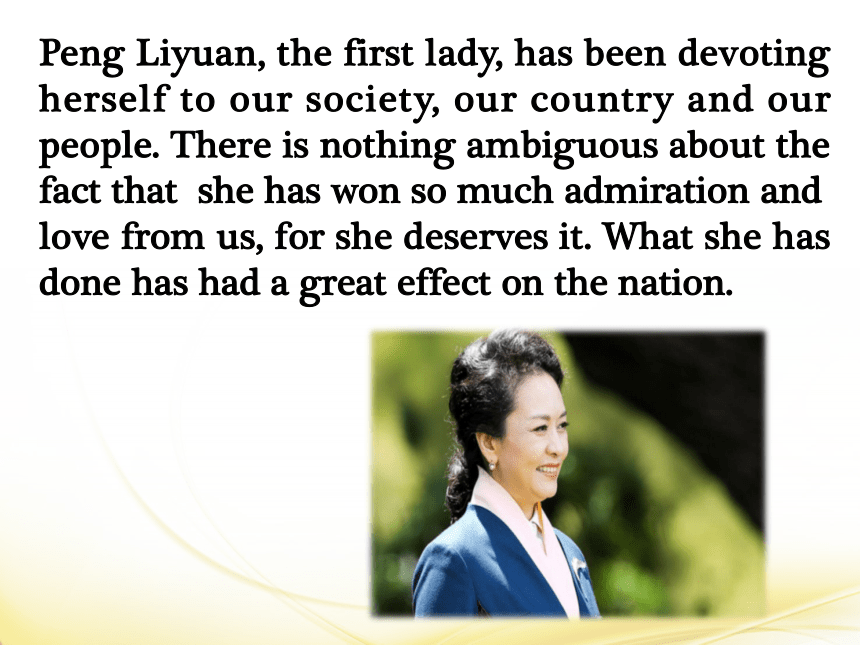
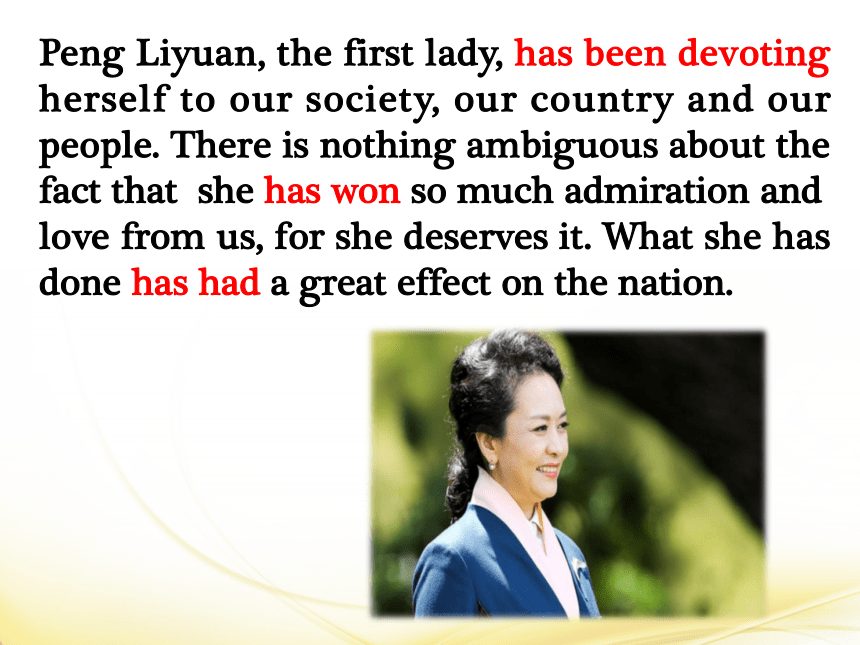
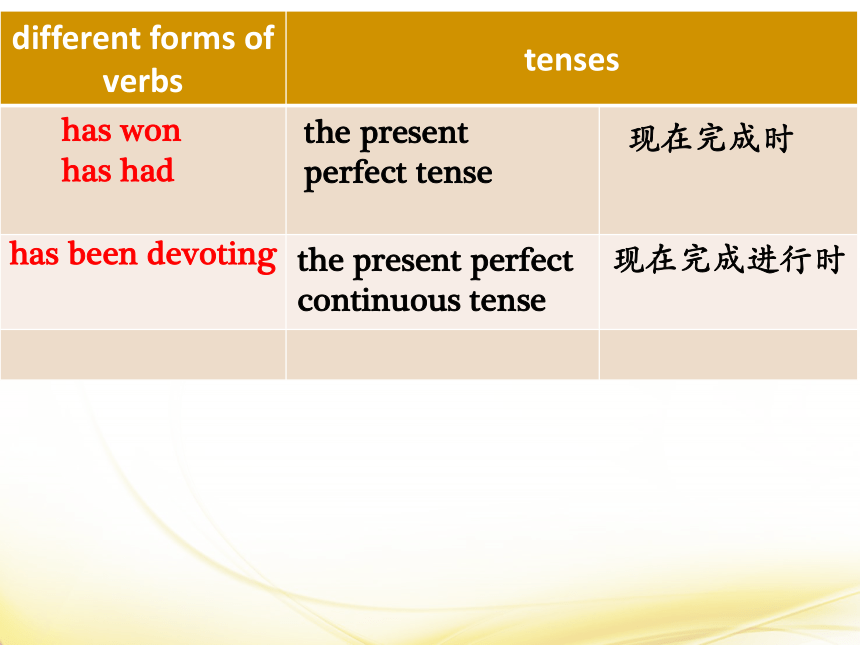




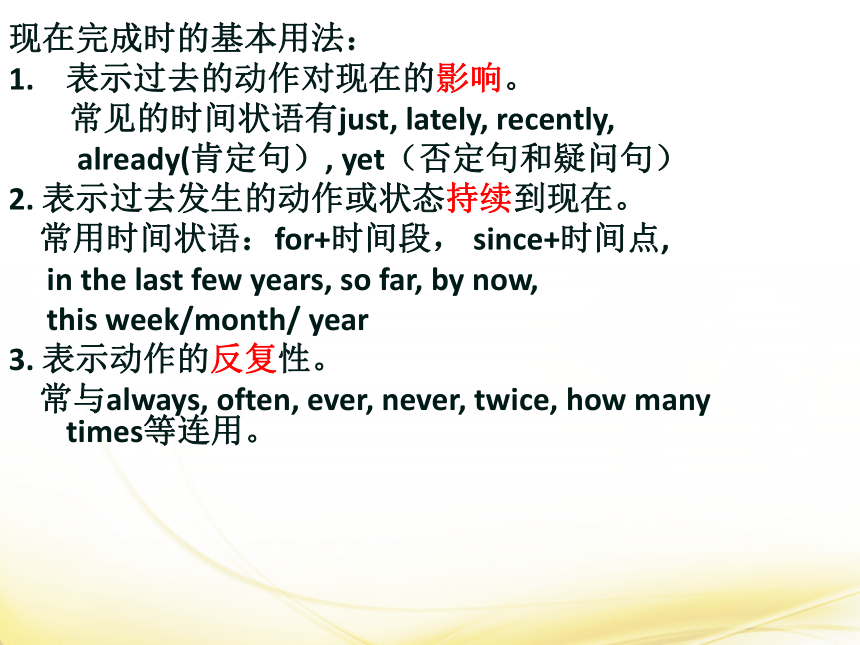
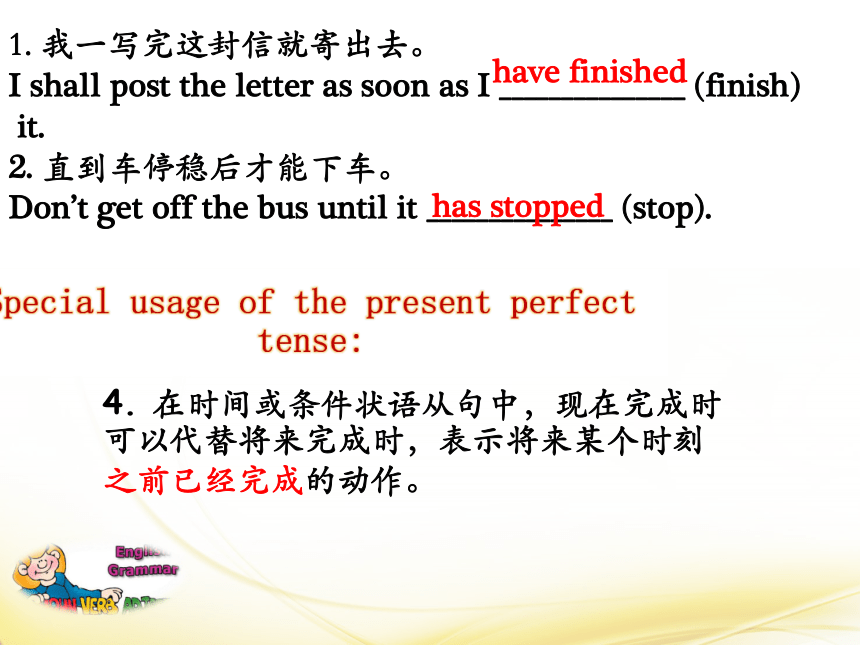
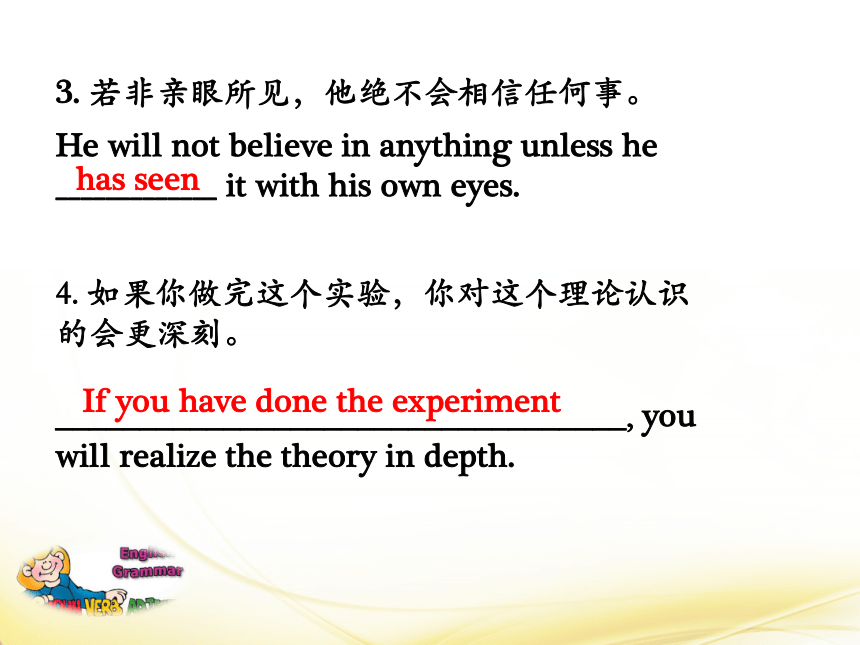
文档简介
课件34张PPT。She is a famous singer.
She is a WHO Goodwill Ambassador(大使) for Aids.
As of 2014, she is listed as the 57th most powerful woman in the world by Forbes.
She is nicknamed as “Peng Mama” by the nation.Peng Liyuan, the first lady, has been devoting herself to our society, our country and our people. There is nothing ambiguous about the fact that she has won so much admiration and love from us, for she deserves it. What she has done has had a great effect on the nation.Peng Liyuan, the first lady, has been devoting herself to our society, our country and our people. There is nothing ambiguous about the fact that she has won so much admiration and love from us, for she deserves it. What she has done has had a great effect on the nation.the present perfect continuous tense现在完成进行时the present perfect tense现在完成时1. The present perfect tense(现在完成时):
由“助动词have/ has + 过去分词”构成。
定义:表示发生在过去的动作到目前为止已经完成或对现在有影响。In addition to(除了) singing, Peng Liyuan is also a Goodwill Ambassador for Aids. She has done a lot to help children with Aids.
Thanks to her care, great changes _____________ (take) place to the Gao Jun.
have takenIt ________________ (be) 35 years since she joined the army in 1980.
She is a civilian member of China’s People’s Liberation Army.has beenExercise:
(1) We ____________ (study) English for about five
years.
(2) They __________ (live) in the south since their
daughter was born.
(3) I __________ (read) your article three times. It’s
well written.
(4) The student ______________ (finish) her
homework already.
(5) She _________________ (not decide) which pair of shoes to buy yet.
(6) Eric _____ just _____ (go) back to his hometown.
have studiedhave livedhave readhas finishedhas gonehasn’t decided现在完成时的基本用法:
表示过去的动作对现在的影响。
常见的时间状语有just, lately, recently,
already(肯定句), yet(否定句和疑问句)
2. 表示过去发生的动作或状态持续到现在。
常用时间状语:for+时间段, since+时间点,
in the last few years, so far, by now,
this week/month/ year
3. 表示动作的反复性。
常与always, often, ever, never, twice, how many times等连用。1. 我一写完这封信就寄出去。
I shall post the letter as soon as I _______________ (finish)
it.
2. 直到车停稳后才能下车。
Don’t get off the bus until it _______________ (stop).
have finishedhas stopped4. 在时间或条件状语从句中,现在完成时可以代替将来完成时,表示将来某个时刻之前已经完成的动作。Special usage of the present perfect tense:3. 若非亲眼所见,他绝不会相信任何事。
He will not believe in anything unless he _____________ it with his own eyes.
has seen4. 如果你做完这个实验,你对这个理论认识的会更深刻。
__________________________________, you will realize the theory in depth.If you have done the experiment1. Mr. Smith ___ in Beijing for many years, so he knows Beijing very well.
A. worked B. would work
C. would be working D. has worked
2. ____ you ____ the film before? Where ____ you ___ it?
A. Have, seen; did, see
B. Did, see; did, watch
C. Have, seen; have, seen
D. Did, see; have, seen
DAthe past tense VS the present perfect tensethe past tense:表示过去发生的动作或情况。过去如此,现在并非如此。
the present perfect tense:表示从过去开始持续到现在的动作或情况,常与一段时间连用,对现在有影响。
Practice1. The reporters ________ (go) missing in 2012 and nobody ___________ (see) them since.
2. I _______________ (study) in Jiangyin No.1 Senior High School for nearly three years.
3. On March 22, 2013, Peng Liyuan ________ (pay) a visit to Russia with her husband, since when the relationship between the two countries ______________________ (improve).
wenthas seenhave studiedhas been improvedpaid4. -- How beautiful the library is, Betty!
--Yes. I ______ here for four years when I was at university.
A. have studied B. studied
C. will study D. had studied
5. — Haven't seen you for ages! Where have you been?
— I went to Ningxia and ________ (stay) there for one year, teaching as a volunteer.
A. have stayed B. stayed
C. will stay D. had stayed
BB6. — Oh no! We’re too late. The train ____ .
— That’s OK. We’ll catch the next train to London.
A. was leaving B. had left
C. has left D. has been leaving
7. I ____ in London for many years, but I’ve never regretted my final decision to move back to China.
A. lived B. was living
C. have lived D. had lived
CA8. We won’t start the work until all the preparations _____.
A. are being made B. will be made
C. have been made D. had been made
9. — When shall we restart our business?
— Not until we _____ our plan.
A. will finish B. are finishing
C. are to finish D. have finishedCD2. The present perfect continuous tense(现在完成进行时):
由“助动词have/ has+ been + doing”构成。
定义:表示从过去开始一直延续到现在的动作,可能刚刚停止,也可能还将继续下去。
用法:现在完成进行时多用延续性动词,常和 all the time, all night, all the morning, this week, this month, recently等状语以及since, for 引导的时间状语从句连用。They ______________________________________(一直致力于)to improving the international image of China since Xi Jinping came into power. have been devoting themselves1. --- We’ve spent too much money recently.
---Well, it isn’t surprising. Our friends and relatives __________ around all the time.
A. are coming B. had come
C. were coming D. have been coming
2. ----Do you want to become a famous film star?
---- That’s what I _________ since I was a little girl.
A. dreamed of
B. have dreamed of
C. dream of
D. have been dreaming of
3. They _________________________ (repair) the road, so they are extremely tired.
They __________________(repair) the road, so we can drive there.
4. Experts for Yetis in the Himalayas for years, but they still one.
A. have looked; haven’t been finding
B. have looked; haven’t been found
C. are looking; haven’t been found
D. have been looking; haven’t found
have been repairinghave repairedthe present perfect tense 强调动作已经完成或对现在有影响。
the present perfect continuous tense 强调动作持续时间的长久性。强调动作一直持续到现在并有可能持续下去。the present perfect tense VS the present perfect continuous tense1. He ____________________________(这些年来他一直在写文章) for our wall-newspaper these years, and he __________________________________(写了约40余篇).
2. — How are you planning to travel to Shanghai?
— I _________________ (not decide) yet, but
I _________________________ (consider) taking a train.has been writing articleshas written about forty articleshaven’t decidedhave been consideringPractice1. We ___________________ (fish) all afternoon, but we _________________ (not catch) any fish yet.
2. The woman ________________________ (try) to make up her mind for the last ten minutes. ________ she _________ (not decide) which pair of shoes to buy yet?
3. We _______________ (hear) from her only once since she went away. However, I _____________________ (write) to her all the time.
4. They _________________________ (practise) that song for some time now, but they still __________________ (not get) it right.Consolidationhas been tryinghaven’t caughthave been fishinghave been writinghave been practisinghave heardhaven’t gotHasn’t decided5. —Why, Jack, you look so tired!
—Well, I _______ the house and I must finish the work tomorrow.
A. have been painting B. was painting
C. will be painting D. have painted
6. Don’t disturb me. I _______ letters all morning and _________ four so far.
A. write; wrote B. has been writing; have written
C. was writing; wrote D. am writing; have written
7. The famous reporter, who is said to have gone back to America last year, _____ in China for almost 20 years.
A. lived B. was living
C. has lived D. have been living
8. The famous reporter, who is said to go to America next year, _______ in China for almost 20 years.
A. lived B. was living
C. has lived D. had lived 9. — During the wartime, he ___ a lot about what he saw and heard in the battlefield.
— Yes. The collection of the stories has been published and sells well.
A. had written B. was writing
C. had been writing D. wrote
《伴你学》P13
1-5 D A C A D
6-10 B A D B B二. 动词填空1. have been fishing; haven’t caught
2. has been trying; Hasn’t decided
3. have heard; have been writing
4. have heard; have been watching
5. has been driving; has had
6. has been ringing; hasn’t answered
7. has been observing; hasn’t talked
8. have been copying; haven’t had
9. have been living; haven’t seen
10. have been practising; haven’t got1. The present perfect tense(现在完成时):
构成:“助动词have/ has + 过去分词”
定义:表示发生在过去的动作到目前为止已经完成或对现在有影响。
用法:
1).表影响。常见的时间状语有just, lately, recently, already(肯定句), yet(否定句和疑问句)
2). 表持续。常用时间状语:for+时间段, since+时间点,
in the last few years, so far, by now, this week/month/ year
3). 表反复。常与always, often, ever, never, twice, how many times等连用。
4). 在时间或条件状语从句中,现在完成时可以代替将来完成时,表示将来某个时刻之前已经完成的动作。
A brief review2. The present perfect continuous tense(现在完成进行时):
构成:“助动词have/ has+ been + doing”
定义:表示从过去开始一直延续到现在的动作,可能刚刚停止,也可能还将继续下去。
用法:现在完成进行时多用延续性动词,常和 all the time, all night, all the morning, this week, this month, recently等状语以及since, for 引导的时间状语从句连用。Assignment Review what is learned in the above period and make some notes.
She is a WHO Goodwill Ambassador(大使) for Aids.
As of 2014, she is listed as the 57th most powerful woman in the world by Forbes.
She is nicknamed as “Peng Mama” by the nation.Peng Liyuan, the first lady, has been devoting herself to our society, our country and our people. There is nothing ambiguous about the fact that she has won so much admiration and love from us, for she deserves it. What she has done has had a great effect on the nation.Peng Liyuan, the first lady, has been devoting herself to our society, our country and our people. There is nothing ambiguous about the fact that she has won so much admiration and love from us, for she deserves it. What she has done has had a great effect on the nation.the present perfect continuous tense现在完成进行时the present perfect tense现在完成时1. The present perfect tense(现在完成时):
由“助动词have/ has + 过去分词”构成。
定义:表示发生在过去的动作到目前为止已经完成或对现在有影响。In addition to(除了) singing, Peng Liyuan is also a Goodwill Ambassador for Aids. She has done a lot to help children with Aids.
Thanks to her care, great changes _____________ (take) place to the Gao Jun.
have takenIt ________________ (be) 35 years since she joined the army in 1980.
She is a civilian member of China’s People’s Liberation Army.has beenExercise:
(1) We ____________ (study) English for about five
years.
(2) They __________ (live) in the south since their
daughter was born.
(3) I __________ (read) your article three times. It’s
well written.
(4) The student ______________ (finish) her
homework already.
(5) She _________________ (not decide) which pair of shoes to buy yet.
(6) Eric _____ just _____ (go) back to his hometown.
have studiedhave livedhave readhas finishedhas gonehasn’t decided现在完成时的基本用法:
表示过去的动作对现在的影响。
常见的时间状语有just, lately, recently,
already(肯定句), yet(否定句和疑问句)
2. 表示过去发生的动作或状态持续到现在。
常用时间状语:for+时间段, since+时间点,
in the last few years, so far, by now,
this week/month/ year
3. 表示动作的反复性。
常与always, often, ever, never, twice, how many times等连用。1. 我一写完这封信就寄出去。
I shall post the letter as soon as I _______________ (finish)
it.
2. 直到车停稳后才能下车。
Don’t get off the bus until it _______________ (stop).
have finishedhas stopped4. 在时间或条件状语从句中,现在完成时可以代替将来完成时,表示将来某个时刻之前已经完成的动作。Special usage of the present perfect tense:3. 若非亲眼所见,他绝不会相信任何事。
He will not believe in anything unless he _____________ it with his own eyes.
has seen4. 如果你做完这个实验,你对这个理论认识的会更深刻。
__________________________________, you will realize the theory in depth.If you have done the experiment1. Mr. Smith ___ in Beijing for many years, so he knows Beijing very well.
A. worked B. would work
C. would be working D. has worked
2. ____ you ____ the film before? Where ____ you ___ it?
A. Have, seen; did, see
B. Did, see; did, watch
C. Have, seen; have, seen
D. Did, see; have, seen
DAthe past tense VS the present perfect tensethe past tense:表示过去发生的动作或情况。过去如此,现在并非如此。
the present perfect tense:表示从过去开始持续到现在的动作或情况,常与一段时间连用,对现在有影响。
Practice1. The reporters ________ (go) missing in 2012 and nobody ___________ (see) them since.
2. I _______________ (study) in Jiangyin No.1 Senior High School for nearly three years.
3. On March 22, 2013, Peng Liyuan ________ (pay) a visit to Russia with her husband, since when the relationship between the two countries ______________________ (improve).
wenthas seenhave studiedhas been improvedpaid4. -- How beautiful the library is, Betty!
--Yes. I ______ here for four years when I was at university.
A. have studied B. studied
C. will study D. had studied
5. — Haven't seen you for ages! Where have you been?
— I went to Ningxia and ________ (stay) there for one year, teaching as a volunteer.
A. have stayed B. stayed
C. will stay D. had stayed
BB6. — Oh no! We’re too late. The train ____ .
— That’s OK. We’ll catch the next train to London.
A. was leaving B. had left
C. has left D. has been leaving
7. I ____ in London for many years, but I’ve never regretted my final decision to move back to China.
A. lived B. was living
C. have lived D. had lived
CA8. We won’t start the work until all the preparations _____.
A. are being made B. will be made
C. have been made D. had been made
9. — When shall we restart our business?
— Not until we _____ our plan.
A. will finish B. are finishing
C. are to finish D. have finishedCD2. The present perfect continuous tense(现在完成进行时):
由“助动词have/ has+ been + doing”构成。
定义:表示从过去开始一直延续到现在的动作,可能刚刚停止,也可能还将继续下去。
用法:现在完成进行时多用延续性动词,常和 all the time, all night, all the morning, this week, this month, recently等状语以及since, for 引导的时间状语从句连用。They ______________________________________(一直致力于)to improving the international image of China since Xi Jinping came into power. have been devoting themselves1. --- We’ve spent too much money recently.
---Well, it isn’t surprising. Our friends and relatives __________ around all the time.
A. are coming B. had come
C. were coming D. have been coming
2. ----Do you want to become a famous film star?
---- That’s what I _________ since I was a little girl.
A. dreamed of
B. have dreamed of
C. dream of
D. have been dreaming of
3. They _________________________ (repair) the road, so they are extremely tired.
They __________________(repair) the road, so we can drive there.
4. Experts for Yetis in the Himalayas for years, but they still one.
A. have looked; haven’t been finding
B. have looked; haven’t been found
C. are looking; haven’t been found
D. have been looking; haven’t found
have been repairinghave repairedthe present perfect tense 强调动作已经完成或对现在有影响。
the present perfect continuous tense 强调动作持续时间的长久性。强调动作一直持续到现在并有可能持续下去。the present perfect tense VS the present perfect continuous tense1. He ____________________________(这些年来他一直在写文章) for our wall-newspaper these years, and he __________________________________(写了约40余篇).
2. — How are you planning to travel to Shanghai?
— I _________________ (not decide) yet, but
I _________________________ (consider) taking a train.has been writing articleshas written about forty articleshaven’t decidedhave been consideringPractice1. We ___________________ (fish) all afternoon, but we _________________ (not catch) any fish yet.
2. The woman ________________________ (try) to make up her mind for the last ten minutes. ________ she _________ (not decide) which pair of shoes to buy yet?
3. We _______________ (hear) from her only once since she went away. However, I _____________________ (write) to her all the time.
4. They _________________________ (practise) that song for some time now, but they still __________________ (not get) it right.Consolidationhas been tryinghaven’t caughthave been fishinghave been writinghave been practisinghave heardhaven’t gotHasn’t decided5. —Why, Jack, you look so tired!
—Well, I _______ the house and I must finish the work tomorrow.
A. have been painting B. was painting
C. will be painting D. have painted
6. Don’t disturb me. I _______ letters all morning and _________ four so far.
A. write; wrote B. has been writing; have written
C. was writing; wrote D. am writing; have written
7. The famous reporter, who is said to have gone back to America last year, _____ in China for almost 20 years.
A. lived B. was living
C. has lived D. have been living
8. The famous reporter, who is said to go to America next year, _______ in China for almost 20 years.
A. lived B. was living
C. has lived D. had lived 9. — During the wartime, he ___ a lot about what he saw and heard in the battlefield.
— Yes. The collection of the stories has been published and sells well.
A. had written B. was writing
C. had been writing D. wrote
《伴你学》P13
1-5 D A C A D
6-10 B A D B B二. 动词填空1. have been fishing; haven’t caught
2. has been trying; Hasn’t decided
3. have heard; have been writing
4. have heard; have been watching
5. has been driving; has had
6. has been ringing; hasn’t answered
7. has been observing; hasn’t talked
8. have been copying; haven’t had
9. have been living; haven’t seen
10. have been practising; haven’t got1. The present perfect tense(现在完成时):
构成:“助动词have/ has + 过去分词”
定义:表示发生在过去的动作到目前为止已经完成或对现在有影响。
用法:
1).表影响。常见的时间状语有just, lately, recently, already(肯定句), yet(否定句和疑问句)
2). 表持续。常用时间状语:for+时间段, since+时间点,
in the last few years, so far, by now, this week/month/ year
3). 表反复。常与always, often, ever, never, twice, how many times等连用。
4). 在时间或条件状语从句中,现在完成时可以代替将来完成时,表示将来某个时刻之前已经完成的动作。
A brief review2. The present perfect continuous tense(现在完成进行时):
构成:“助动词have/ has+ been + doing”
定义:表示从过去开始一直延续到现在的动作,可能刚刚停止,也可能还将继续下去。
用法:现在完成进行时多用延续性动词,常和 all the time, all night, all the morning, this week, this month, recently等状语以及since, for 引导的时间状语从句连用。Assignment Review what is learned in the above period and make some notes.
